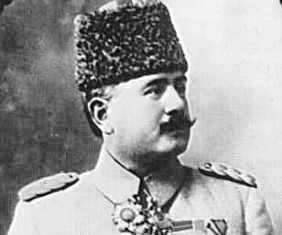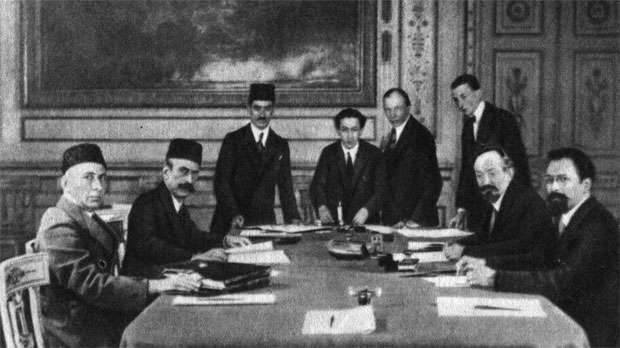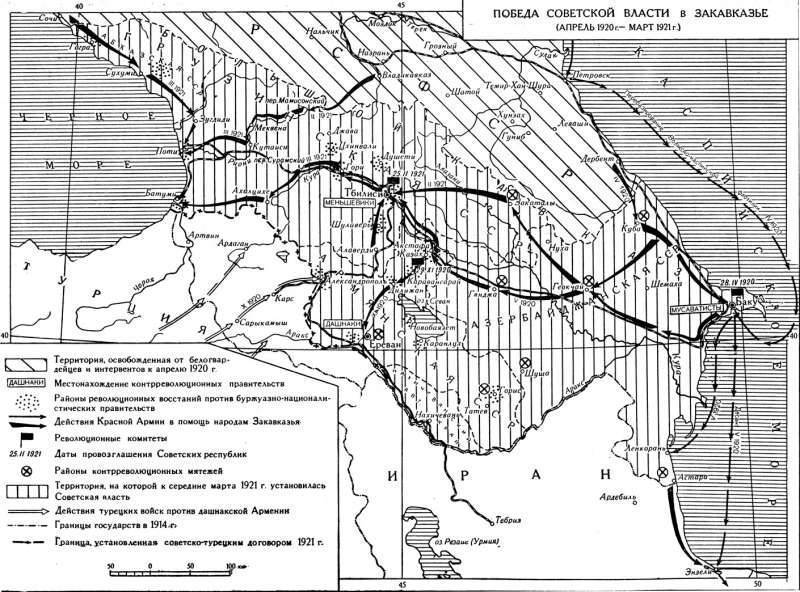Moscow Treaty. How the Soviet-Turkish border was created
The First World War led to the most serious changes in the political map of the world. Owing to the collapse of the three empires - the Russian, Austro-Hungarian and Ottoman - a whole series of new sovereign states appeared on the world map. Their appearance was accompanied by border conflicts, territorial disputes and local wars. The Transcaucasus, located at the junction of the collapsed Russian and Ottoman empires and in the spectrum of geopolitical interests not only of Soviet Russia and Turkey, which inherited the disintegrated empires, but also Great Britain and the United States, was no exception. When 30 October 1918 Turkey signed the Mudros truce with the countries of the Entente, she was ordered to exempt Transcaucasia from the presence of the Turkish troops and return the borders of the Turkish state to the state before 1878. However, considering that a large Turkic-Muslim population lived on the territory of the former Kars region, the British authorities gave the go-ahead to create the so-called “Republic of the South-Western Caucasus”. It was to include the population of the Turkic and Muslim populations of the land of Kars region, Batumi region, Akhalkalaki and Akhaltsikhe districts of Tiflis province, Nakhichevan, Surmalinsky, Sharur-Daralagozsky and western parts of the Alexandropol districts of Erivan province.
When in September 1919 was formed in Sivas a representative committee headed by a Turkish patriot, General Mustafa Kemal, who embarked on Turkey’s national liberation, the United Kingdom made a number of important decisions. First, 8 April 1920 Batumi region was declared a special territory under the protection of the League of Nations. The region housed British, French and Italian troops. Secondly, two days later, on April 10 1920, the British authorities announced the liquidation of the South-West Caucasus, and the territory of the latter was transferred to the Republic of Armenia. Meanwhile, on April 26, 1920, the Chairman of the Presidium of the Grand National Assembly of Turkey (GNNT), General Mustafa Kemal, addressed the Chairman of the Council of People’s Commissars of the RSFSR, V.I. Lenin with a proposal to establish diplomatic relations between Turkey and Soviet Russia and with a request to provide full assistance to Turkey in the struggle for national independence. Since all the Entente powers at that time were actually enemies of the Turkish statehood under construction, and the old Ottoman ally, Germany, defeated in World War I, was in a difficult political and economic situation, Soviet Russia was viewed by Mustafa Kemal as the only country capable of supporting young Turkey. Following Mustafa Kemal's appeal to Lenin, Moscow was visited by the people's commissar of foreign affairs of the government of the Grand National Assembly of Turkey Bekir Sami and his deputy Yusuf Kemal, who met with the people's commissar of foreign affairs of the RSFSR G.V. Chicherin. In the meantime, the Entente powers tried by all means to strengthen their influence in Transcaucasia. Thus, the Allies made a decision to establish the borders between Turkey and Armenia by appealing to the arbitration of US President Woodrow Wilson.
 Naturally, this did not suit the Turkish side, which feared the withdrawal of a large part of the eastern lands under the authority of Armenia. The Eastern Army of Lieutenant-General Kazim-Pasha Karabekir was sent to the Turkish-Armenian border (in the photo). At the same time, the Batumi region was transferred to Georgia by the command of the allied forces. However, by this time, units of the Red Army had already launched an offensive against the Transcaucasian republics. July 28 - August 1 1920 was occupied by the Nakhichevan district. 14 August 1920 was personally received by the delegation of Turkey Vladimir Ilyich Lenin, after which 24 August was signed an agreement on cooperation between the RSFSR and Turkey. Soviet Russia promised to provide financial, material and military assistance to the Turkish side, with the amount of financial assistance reaching 10 million gold rubles.
Naturally, this did not suit the Turkish side, which feared the withdrawal of a large part of the eastern lands under the authority of Armenia. The Eastern Army of Lieutenant-General Kazim-Pasha Karabekir was sent to the Turkish-Armenian border (in the photo). At the same time, the Batumi region was transferred to Georgia by the command of the allied forces. However, by this time, units of the Red Army had already launched an offensive against the Transcaucasian republics. July 28 - August 1 1920 was occupied by the Nakhichevan district. 14 August 1920 was personally received by the delegation of Turkey Vladimir Ilyich Lenin, after which 24 August was signed an agreement on cooperation between the RSFSR and Turkey. Soviet Russia promised to provide financial, material and military assistance to the Turkish side, with the amount of financial assistance reaching 10 million gold rubles. 10 August 1920 in the suburbs of Paris Sevres between representatives of the sultan government of the Ottoman Empire, which no longer had real power in Turkey, and the countries of the Entente signed the Sevres peace treaty. In accordance with the treaty, Turkey recognized the state sovereignty of the Republic of Armenia, and the issue of the state border was still submitted to Woodrow Wilson’s arbitration. Neither the government of the Grand National Assembly of Turkey, nor the Council of People's Commissars of the RSFSR recognized the Sevres Peace Treaty. September 18 Armenian army tried to go on the offensive, but suffered serious losses from the Turkish troops. For ten days, the Turks were able to capture a number of strategically important settlements and forced the Armenian government to appeal for help to the whole world. But even Georgia chose to declare its neutrality in the Turkish-Armenian conflict. As a result of October 30 1920, the Turkish troops occupied Kars. Commander of the Eastern Army of Turkey, Lieutenant-General Kazim-Pasha Karabekir appealed to the command of the Armenian army with the requirement to transfer communications to Turkey in the area of Alexandropol. The Armenian command was forced to agree with the demands of the Turkish side and withdraw the troops.
7 November 1920 The city of Alexandropol was occupied by the Turkish army. General Karabekir again appealed to the Armenian command - this time, demanding to withdraw the Armenian troops further to the east and, moreover, to transfer to the Turkish command a significant amount of armament, ammunition and horses. The refusal of the Armenian side to meet the requirements of the Turkish command led to the resumption of hostilities. 12 November 1920. Turkish troops were ready to attack on Erivan. The Turkish command forced the Armenian leadership to sign a declaration on the refusal of Armenia from the Treaty of Sevres. Practically two thirds of the pre-war territory of Armenia were under the control of the Turkish troops. Simultaneously with the ongoing negotiations, units of the 11 Army of the Red Army of the RSFSR entered the territory of Armenia. They supported the uprising of the Armenian Bolsheviks, raised on November 29 against the government of Republican Armenia.
On the night of December 3. 1920 in Alexandropol, the Armenian delegation signed a peace treaty with the Turkish side. In accordance with the text of the treaty, only small territories in the region of Erivan and Lake Sevan (Turkish name - Gokcha) remained under the control of the Armenian side. As for the Kars region, Alexandropol and Surmalin counties, they were transferred under the control of Turkey. However, the 10 of December 1920 of the Council of People's Commissars of the Armenian SSR, created by the Bolsheviks of Armenia with the support of the Red Army of the RSFSR, refused to recognize the peace treaty concluded in Alexandropol and demanded new negotiations with Turkey. The demand was supported by Soviet Russia, which also offered the Turkish leadership to move to new negotiations.
People's Commissar for Foreign Affairs of the RSFSR G.V. Chicherin demanded that the Turkish side transfer to Armenia all regions that were part of the Russian Empire before 1914, as well as part of the Van and Bitlis regions. But Mustafa Kemal refused to offer the Soviet side, stating in an ultimatum that Turkey is not going to give up the slightest shred of its land. Prominent Bolsheviks Nestor Lakoba and Efrem Eshba were sent to Turkey to continue the talks. A major change in the political situation in the region occurred after the 25 of February 1921, part of the Red Army of the RSFSR, entered Tiflis. On the territory of most of Georgia, the Georgian SSR was proclaimed with its capital in Tiflis. The authorities of the Republic of Georgia were forced to retreat to the territory of the Batumi region. 11 March 1921 The Turkish troops who invaded Batumi region in the beginning of the month occupied Batum.

While the Red Army and the Turkish troops occupied the territory of Georgia, no less significant political events took place in Moscow. 26 February The 1921 was opened by the Moscow Conference. 16 March 1921 USSR People’s Commissar for Foreign Affairs Georgy Chicherin and Jelal Korkmasov, member of the All-Russian Central Executive Committee on the Soviet side, People’s Commissar for Foreign Affairs of Turkey, Yusuf Kemal Bey, Ali Fuad Pasha and Riza Nur Bey from the Turkish side, signed the Treaty of "Friendship and brotherhood "between Soviet Russia and Turkey. The Russian-Turkish treaty consisted of 16 articles and 3 applications. The parties recognized the waiver of all previous treaties as not meeting the interests of both states. According to the agreement, the former Kars region, the southern part of the Batumi region, Surmalinsky district of the Erivan province with Mount Ararat were part of Turkey. The northern part of the Batumi region with the city of Batum was part of the Georgian SSR, but the local population gained wide autonomy (a significant part of the region’s population was Islamicized Ajarians whose Turkish government was concerned), and Turkey had significant trade privileges. Autonomy under the administration of the Azerbaijan SSR was formed on the territory of the Nakhichevan district of the Erivan province, while Azerbaijan assumed obligations not to cede this territory to the “third party” (implied Armenia, on the border of which the Nakhchivan enclave was formed). Thus, it was in accordance with the Moscow Treaty that the state borders of the Soviet republics with Turkey were established.
Later, the Soviet Union tried to revise points of the Moscow Treaty. This aspiration was preceded by Turkey’s hostile policy towards the Soviet state during the Second World War. Since Turkey at that time maintained good relations with Germany, the Soviet leadership viewed Ankara as a potential ally of Berlin and feared Turkey's entry into the war against the Soviet Union in Transcaucasia. Therefore, in the region there were significant forces of the Red Army, which, accordingly, were not used on the front against the Nazis. It turns out that Turkey, who did not take part in the war, was actually dragging out a large part of the Soviet armed forces. When Hitler's Germany was defeated, I.V. Stalin tried to raise the issue of revising the Soviet-Turkish borders. The leadership of the Armenian SSR, which advocated the return of borders to the 1914 state, was addressed to the Union leadership with requests to revise the border. Armenia claimed the former Kars region and the Surmalinsky district of the former Erivan province, which became part of Turkey under the Moscow 1921 treaty. The Georgian Soviet Socialist Republic, which wanted to join the southern part of the Batumi district and the Artvinsky district of the former Batumi region, as well as the Ardagan and Oltinsky districts of the former Kars region, also had claims against Turkey. Even the preparation of public opinion for the return of these territories began - for example, in 1949, the Georgian writer Ilya Mosashvili wrote the play “The Flooded Stones”, which narrated about the national liberation struggle of the Georgian population living in Turkey. For this play, Mosashvili received the Stalin Prize 2 degree. The Georgian leadership also considered the possibility of Lazistan joining the Soviet Union, a historic region populated by Lazy, one of the Georgian peoples. However, the Western powers did not support the claims of the Soviet Union to Turkey, fearing the growing influence of the USSR in the Persian region. Turkey became a member of the emerging aggressive NATO bloc and became the most important strategic partner of the United States and Great Britain in the region. 30 May 1953, after the death of I.V. Stalin, the USSR Ministry of Foreign Affairs officially announced the absence of territorial claims against Turkey.
- P P 'SЊSЏ RџRѕR "RѕRЅSЃRєRёR№
- http://historic.ru/,

Information